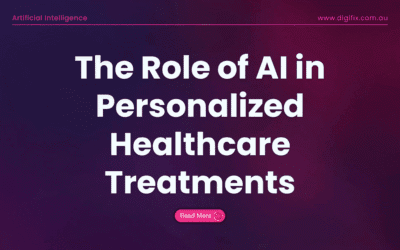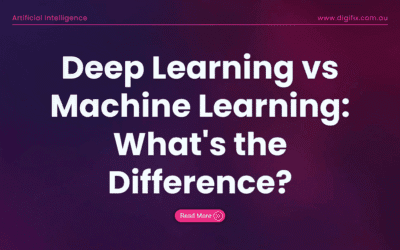Can artificial intelligence truly revolutionize the healthcare industry? The answer lies in understanding how artificial intelligence is transforming healthcare today.
The healthcare sector is on the cusp of a significant transformation, driven by the integration of artificial intelligence. As a leading AI automation agency, DigiFix helps businesses harness the power of AI to optimize workflows and improve productivity.
By leveraging AI technologies, healthcare providers can enhance patient care, streamline clinical workflows, and make data-driven decisions. This not only improves the quality of care but also reduces costs and enhances patient outcomes.
Key Takeaways
- Artificial intelligence is transforming the healthcare industry in various ways.
- DigiFix offers AI automation services to optimize business workflows.
- AI enhances patient care and streamlines clinical workflows.
- The integration of AI in healthcare improves patient outcomes and reduces costs.
- AI-driven decision-making is becoming increasingly important in healthcare.
The Evolution of AI in Healthcare
The healthcare sector is witnessing a significant shift with the advent of AI technologies. This transformation is not just about adopting new tools; it’s about revolutionizing the way healthcare is delivered.
From Concept to Reality: The AI Journey in Medicine
The journey of AI in medicine has been remarkable. Initially, AI was seen as a futuristic concept, but it has now become a reality, with numerous applications in healthcare. AI in healthcare examples include diagnostic algorithms that can detect diseases more accurately and quickly than human clinicians.
One of the significant advancements is in diagnostic assistance, where AI algorithms can analyze medical images to identify abnormalities. This not only improves diagnostic accuracy but also speeds up the process, allowing for timely interventions.
Key Statistics and Market Growth
The growth of AI in healthcare is backed by impressive statistics. The global AI in healthcare market is expected to grow significantly, driven by the increasing demand for efficient healthcare services.
- The AI healthcare market is projected to reach $31.3 billion by 2025.
- The use of AI in healthcare is expected to reduce healthcare costs by 10% by 2025.
- Over 85% of healthcare organizations are expected to adopt AI technology by 2024.
These statistics underscore the growing importance of AI and healthcare, highlighting the potential for AI to transform the industry.
Understanding AI Technologies Revolutionizing Healthcare
The healthcare industry is on the cusp of a revolution, driven by the integration of AI technologies. These advancements are transforming various aspects of healthcare, from diagnosis and treatment to patient care and administrative tasks. At the forefront of this revolution are three key AI technologies: Machine Learning, Natural Language Processing, and Computer Vision.
Machine Learning in Medical Applications
Machine Learning (ML) is a subset of AI that involves training algorithms on large datasets to make predictions or decisions. In healthcare, ML is being used for:
- Predictive analytics to identify high-risk patients
- Personalized medicine by tailoring treatment plans to individual patient profiles
- Analyzing medical images to detect abnormalities
Natural Language Processing for Medical Documentation
Natural Language Processing (NLP) enables computers to understand and generate human language. In healthcare, NLP is used for:
- Clinical documentation: automating the process of documenting patient information
- Speech recognition: transcribing doctor-patient conversations into text
- Text analysis: extracting relevant information from unstructured clinical notes
Computer Vision in Diagnostics
Computer Vision is a technology that enables computers to interpret and understand visual information from images. In healthcare, Computer Vision is being applied in:
- Medical imaging analysis: detecting diseases such as cancer from X-rays and MRIs
- Image-guided surgery: enhancing surgical precision by providing real-time visual feedback
- Disease diagnosis: analyzing retinal scans to detect diabetic retinopathy
These AI technologies are not only improving the accuracy and efficiency of healthcare services but also enhancing patient experiences. As AI automation in health care continues to evolve, we can expect even more innovative applications that transform the healthcare landscape.
Transformative Applications of AI in Healthcare
The integration of AI in healthcare is revolutionizing the way medical professionals diagnose and treat patients. By leveraging advanced technologies like machine learning and natural language processing, AI is transforming various aspects of healthcare, from diagnostic assistance to personalized treatment plans.
Diagnostic Assistance and Medical Imaging
AI algorithms are significantly enhancing diagnostic accuracy and speed, particularly in medical imaging. Computer vision technologies can analyze images from MRIs, CT scans, and X-rays to identify abnormalities that may be missed by human eyes. This not only improves patient outcomes but also streamlines the diagnostic process, allowing healthcare professionals to focus on treatment rather than detection.
The benefits of AI in healthcare are evident in diagnostic assistance, where AI systems can help reduce false positives and negatives, thus improving overall diagnostic accuracy. For instance, AI-powered image analysis can help detect early signs of diseases like cancer, enabling timely interventions.
Drug Discovery and Development
AI is also transforming the pharmaceutical industry by accelerating drug discovery and development. By analyzing vast datasets, AI can identify potential drug candidates and predict their efficacy and safety. This significantly reduces the time and cost associated with bringing new drugs to market, ultimately benefiting patients by providing them with access to innovative treatments sooner.
The future of AI in healthcare is particularly promising in drug discovery, where AI can help personalize drug development based on genetic profiles and disease characteristics. This tailored approach can lead to more effective treatments with fewer side effects.
Personalized Treatment Plans
Personalized medicine is another area where AI is making a significant impact. By analyzing patient data, including genetic information, medical histories, and lifestyle factors, AI can help healthcare providers develop customized treatment plans tailored to individual needs.
Genetic Analysis and Precision Medicine
Genetic analysis is a critical component of precision medicine, enabling healthcare providers to understand the genetic underpinnings of a patient’s condition. AI can analyze genetic data to identify specific mutations and recommend targeted therapies. The benefits of AI in healthcare are clear in this context, as precision medicine can lead to more effective treatments and better patient outcomes.
Customized Care Pathways
AI can also help develop customized care pathways by analyzing patient data and predicting disease progression. This allows healthcare providers to intervene early and adjust treatment plans accordingly. The future of AI in healthcare is bright, with customized care pathways becoming increasingly sophisticated and personalized.
As AI continues to evolve, its applications in healthcare will only expand, leading to improved patient care, streamlined clinical workflows, and enhanced operational efficiency. By embracing AI, healthcare organizations can position themselves at the forefront of medical innovation, ultimately shaping the future of healthcare.
AI-Powered Patient Care Innovations
With AI at the forefront, patient care is experiencing a significant shift towards more personalized and efficient services. The healthcare industry is witnessing a transformative change with the integration of AI technologies, enhancing patient outcomes and experiences.
Virtual Health Assistants and Chatbots
Virtual health assistants and chatbots are revolutionizing patient engagement by providing 24/7 support and personalized care. These AI-powered tools help patients navigate healthcare services, schedule appointments, and access medical information, thereby improving patient satisfaction and reducing administrative burdens on healthcare providers.
For instance, chatbots can assist patients by answering common queries, offering medication reminders, and even providing basic diagnostic support. This not only enhances the patient experience but also allows healthcare professionals to focus on more complex and critical care tasks.
Remote Patient Monitoring Systems
Remote patient monitoring systems leverage AI to track patients’ vital signs and health metrics in real-time, enabling proactive care and timely interventions. These systems are particularly beneficial for managing chronic conditions, post-operative care, and monitoring patients with specific health risks.
By continuously analyzing data from wearable devices and other health monitors, AI algorithms can identify potential health deteriorations early, alerting healthcare providers to take necessary actions. This capability not only improves patient outcomes but also reduces hospital readmissions and healthcare costs.
Predictive Analytics for Patient Outcomes
Predictive analytics is another area where AI is making a significant impact. By analyzing vast amounts of patient data, AI can predict patient outcomes, identify high-risk patients, and suggest preventive measures. This enables healthcare providers to adopt a more proactive approach to patient care, improving overall health outcomes.
For example, predictive analytics can help in forecasting patient admissions, allowing hospitals to better manage resources and staffing. It can also aid in personalizing treatment plans based on a patient’s historical data and predictive insights, leading to more effective care.
At DigiFix, our Custom AI Strategy Sessions can help healthcare organizations implement these innovations effectively, enhancing patient care and operational efficiency. By leveraging AI-powered patient care innovations, healthcare providers can significantly improve patient outcomes and experiences, marking a new era in healthcare delivery.
How AI is Streamlining Healthcare Operations
AI is transforming the healthcare landscape by streamlining operations. This transformation is multifaceted, impacting various aspects of healthcare management.
Administrative Workflow Automation
The administrative burden in healthcare is significant, with tasks such as scheduling, billing, and record-keeping consuming considerable resources. AI automation can significantly reduce this burden by automating routine tasks, thus improving efficiency and reducing the likelihood of human error.
For instance, AI-powered chatbots can handle patient inquiries, freeing up staff to focus on more complex issues. Additionally, AI can automate billing processes, ensuring accuracy and speeding up reimbursement.
Resource Allocation and Management
AI can optimize resource allocation by analyzing data on patient flow, staff workload, and equipment usage. This enables healthcare providers to make informed decisions about resource distribution, ensuring that resources are utilized effectively.
AI in healthcare examples include predictive analytics tools that forecast patient admission rates, allowing hospitals to adjust staffing and bed availability accordingly.
Reducing Healthcare Costs Through AI Implementation
By streamlining operations and improving resource allocation, AI can help reduce healthcare costs. For example, AI-driven automation can minimize waste and reduce the need for manual labor in administrative tasks.
At DigiFix, we offer 100% FREE initial consultations for AI implementation strategies tailored to your healthcare organization’s needs. Our expertise in AI automation can help you navigate the complexities of integrating AI into your operations.
The Benefits of AI in Healthcare
The benefits of AI in healthcare are multifaceted, impacting both patients and providers. By leveraging AI technologies, healthcare organizations can significantly improve the quality and efficiency of care.
Improved Diagnostic Accuracy and Speed
AI algorithms can analyze vast amounts of medical data quickly and accurately, helping doctors diagnose conditions more effectively. Diagnostic assistance systems can detect abnormalities in medical images, such as X-rays and MRIs, allowing for timely interventions.
Enhanced Patient Experience and Engagement
AI-powered chatbots and virtual health assistants are enhancing patient engagement by providing personalized support and guidance. These tools help patients manage their health more effectively, improving overall satisfaction.
Time and Cost Efficiency for Healthcare Providers
AI is streamlining healthcare operations, reducing administrative burdens, and optimizing clinical workflows. By automating routine tasks, healthcare providers can focus on more complex and high-value tasks.
Reduced Administrative Burden
AI-driven automation solutions can significantly reduce the administrative workload, allowing healthcare professionals to devote more time to patient care. This not only improves efficiency but also reduces the likelihood of administrative errors.
Optimized Clinical Workflows
By analyzing data and predicting patient needs, AI can help optimize clinical workflows, ensuring that resources are allocated more effectively. This leads to better patient outcomes and more efficient use of healthcare resources.
Book your session now and take the first step toward AI-powered success.
Challenges and Ethical Considerations in Healthcare AI
While AI is revolutionizing healthcare, it’s crucial to address the associated challenges and ethical dilemmas. As healthcare becomes increasingly reliant on AI automation in health care, several concerns need to be mitigated to ensure the safe and effective integration of these technologies.
Data Privacy and Security in Medical Contexts
One of the primary concerns is the protection of sensitive patient data. Ensuring the privacy and security of medical information is paramount, especially as AI systems handle vast amounts of personal health data. Robust data protection measures must be implemented to prevent breaches and maintain patient trust.
Regulatory Compliance and FDA Approval Processes
Another significant challenge is navigating the complex regulatory landscape. AI solutions in healthcare must comply with stringent regulations, including obtaining approvals from bodies like the FDA. Understanding and adhering to these regulatory requirements is crucial for the successful deployment of AI technologies.
Balancing Human Expertise with AI Capabilities
Finding the right balance between leveraging AI capabilities and maintaining the essential human touch in healthcare is also a key consideration. While AI can enhance diagnostic accuracy and streamline processes, how artificial intelligence is transforming healthcare also means that healthcare professionals must work alongside AI systems effectively.
Addressing these challenges and ethical considerations is vital to harnessing the full potential of AI in healthcare. By doing so, we can ensure that AI technologies are used responsibly and effectively, ultimately improving patient outcomes and the overall quality of care.
DigiFix: Your Partner for AI in Healthcare Implementation
In the rapidly changing landscape of healthcare, DigiFix emerges as a key partner, leveraging AI to drive innovation and efficiency. With a comprehensive suite of services tailored to the healthcare industry, DigiFix is poised to transform the way healthcare organizations operate and deliver care.
Custom AI Strategy Sessions for Healthcare Organizations
DigiFix offers bespoke AI strategy sessions designed to meet the unique needs of healthcare organizations. These sessions are aimed at identifying opportunities for AI integration, streamlining processes, and improving patient outcomes. By understanding the specific challenges faced by healthcare providers, DigiFix crafts AI strategies that are both practical and impactful.
Healthcare-Specific AI Automation Solutions
Through its innovative AI automation solutions, DigiFix helps healthcare organizations reduce administrative burdens, enhance patient engagement, and optimize resource allocation. By automating routine tasks, healthcare professionals can focus on what matters most – delivering high-quality patient care.
AI Training & Workshops for Medical Teams
DigiFix recognizes the importance of AI literacy among healthcare professionals. To this end, the company offers AI training and workshops designed to equip medical teams with the knowledge and skills needed to effectively leverage AI technologies.
Building AI Literacy Among Healthcare Professionals
These training programs cover a range of topics, from the basics of AI and machine learning to more advanced applications in healthcare. By empowering healthcare professionals with AI knowledge, DigiFix enables them to make informed decisions about AI adoption and implementation.
Practical Implementation Strategies
Beyond training, DigiFix provides practical implementation strategies to ensure that AI solutions are seamlessly integrated into existing healthcare systems. This includes guidance on change management, workflow optimization, and ongoing support to ensure the long-term success of AI initiatives.
By partnering with DigiFix, healthcare organizations can unlock the full potential of AI in healthcare, driving improvements in patient care, operational efficiency, and overall competitiveness in a rapidly evolving healthcare landscape.
Conclusion: Embracing the Future of Healthcare with AI
The healthcare industry is on the cusp of a revolution, driven by the transformative power of artificial intelligence. As we’ve explored, AI is not just a tool, but a catalyst for change, improving diagnostic accuracy, enhancing patient experience, and streamlining healthcare operations. The impact of AI on the health industry is profound, from diagnostic assistance and medical imaging to drug discovery and personalized treatment plans.
By embracing AI, healthcare organizations can unlock new levels of efficiency, reduce costs, and improve patient outcomes. The benefits of AI in healthcare are multifaceted, and its potential to revolutionize the industry is vast. As we move forward, it’s essential to continue exploring the possibilities of AI automation and its applications in healthcare.
Let’s explore how AI automation can take your business to the next level, enhancing your services and improving patient care. The future of healthcare is here, and it’s powered by AI.
FAQ
How is artificial intelligence transforming the healthcare industry?
Artificial intelligence is transforming healthcare by improving diagnostic accuracy, streamlining clinical workflows, and enhancing patient care through personalized treatment plans and predictive analytics.
What are some examples of AI in healthcare?
Examples of AI in healthcare include diagnostic assistance, drug discovery, virtual health assistants, remote patient monitoring systems, and AI-powered medical imaging analysis.
How does AI automation benefit healthcare operations?
AI automation benefits healthcare operations by reducing administrative burdens, improving resource allocation, and enhancing overall efficiency, leading to cost savings and improved patient outcomes.
What are the challenges associated with implementing AI in healthcare?
Challenges include ensuring data privacy and security, navigating regulatory compliance and FDA approval processes, and striking a balance between human expertise and AI capabilities.
How can healthcare organizations implement AI solutions effectively?
Healthcare organizations can implement AI solutions effectively by developing custom AI strategies, leveraging healthcare-specific AI automation solutions, and providing AI training and workshops for their teams.
What is the future of AI in healthcare?
The future of AI in healthcare is promising, with ongoing advancements in machine learning, natural language processing, and computer vision expected to drive further innovation and improvement in patient care and healthcare operations.
How has AI impacted the health industry?
AI has significantly impacted the health industry by improving diagnostic accuracy, enhancing patient engagement, and streamlining healthcare operations, ultimately leading to better patient outcomes and more efficient healthcare services.





0 Comments